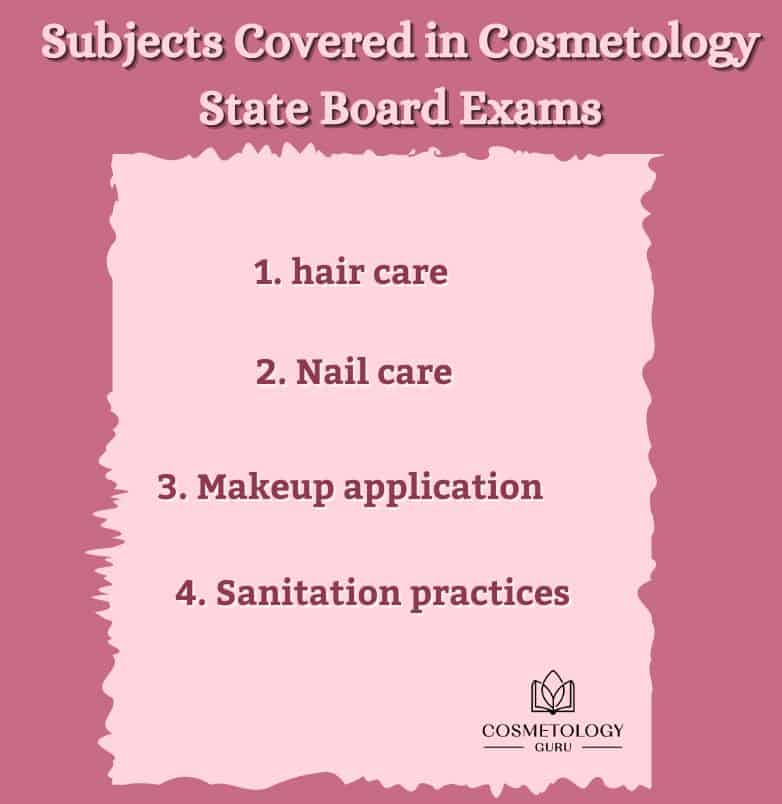Cosmetology and esthetician state board exams play a pivotal role in shaping careers within the beauty industry. These exams serve as gateways to becoming licensed professionals, but they differ in various aspects, including content, career opportunities, and required skill sets.
Cosmetology encompasses a broader spectrum, covering various beauty treatments and hairstyling, while esthetics focuses predominantly on skincare and facial treatments. Both paths offer rewarding careers but require distinct skill sets and knowledge.
Sponsored
Understanding Cosmetology State Board Exams
Cosmetology state board exams evaluate a comprehensive range of subjects, including hair care, nail care, makeup application, and sanitation practices. Aspiring cosmetologists need to master these areas to succeed in their licensing exam.
Subjects Covered in Cosmetology State Board Exams

The curriculum typically includes theoretical knowledge and practical skills in haircutting, hair coloring, chemical treatments, skincare, and sanitation protocols. Mastery in these areas is essential to pass the exam.
Preparation Tips for the Exam
Successful candidates often engage in rigorous study routines, practice hands-on skills, and utilize study guides and mock exams. Professional guidance and mentorship can also enhance preparation.
Insights into Esthetician State Board Exams
Esthetician state board exams primarily focus on skincare, facial treatments, and makeup application. Individuals pursuing this path need a deep understanding of skincare techniques and product knowledge.
Focus Areas and Topics in Esthetician State Board Exams
The exam emphasizes skincare analysis, facial treatments, hair removal techniques, and makeup application. Aspiring estheticians should excel in these areas to obtain their license.
How to Excel in the Esthetician State Board Exam
Dedicated practice, familiarity with skincare products, and mastering facial techniques are crucial to passing the esthetician state board exam. Practical experience and continuous learning also contribute to success.
Differences Between Cosmetology and Esthetician State Board Exams
Cosmetology and esthetician exams differ significantly in content and skill sets required. While cosmetologists focus on a wider array of beauty treatments, estheticians specialize in skincare and facial treatments.
Variances in Content and Skill Sets Required
Cosmetology exams cover hairstyling, nail care, and broader beauty treatments, whereas esthetician exams concentrate on skincare, facials, and makeup application. The depth of knowledge in each field differs.
Career Paths After Completing Each Exam
Cosmetologists often pursue careers in salons, spas, or even freelance opportunities, while estheticians may work in skincare clinics, medispas, or alongside dermatologists. Both paths offer diverse career opportunities.
Pros and Cons of Pursuing Cosmetology or Esthetician Licensing
Choosing between cosmetology and esthetics involves considering the advantages and disadvantages of each career path.
Advantages and Disadvantages of Each Career Path
Cosmetology offers versatility and a broader scope, but it might require more initial training. Esthetics provides specialization but may limit career options compared to cosmetology.
Personal Suitability for Either Profession
Individual preferences, interests, and skills play a crucial role in determining which field aligns better with one’s aspirations and strengths.
Examining Career Opportunities for Cosmetologists and Estheticians
Both cosmetologists and estheticians have promising career prospects within the beauty industry, offering diverse job opportunities and potential for growth.
Job Prospects and Diversity in the Beauty Industry
Cosmetologists can work in salons, spas, or pursue freelance work, catering to a wide range of beauty treatments. Estheticians find roles in skincare clinics, medispas, or collaborating with dermatologists, focusing on skin health and treatments.
Salary Ranges and Potential Growth in the Field
Salaries in both fields vary based on experience, location, and specialization. However, with expertise and experience, professionals in both cosmetology and esthetics can potentially achieve lucrative career growth.
Key Similarities Between Cosmetology and Esthetician State Board Exams
Although distinct in their focus areas, these exams share common elements, ensuring a foundational understanding and skills necessary for success in the beauty industry.
Overlapping Areas in the Curriculum
Both exams emphasize sanitation practices, client communication, and business ethics. They also require a practical demonstration of skills along with theoretical knowledge.
Common Skills Necessary for Success
Attention to detail, creativity, customer service, and the ability to adapt to evolving beauty trends are essential skills for success in both cosmetology and esthetics.
Addressing Misconceptions and Myths
There are prevalent misconceptions about the roles of cosmetologists and estheticians, often leading to confusion about their specific skills and career paths.
Debunking Common Misunderstandings About These Exams
One common myth is that these professions have identical job responsibilities. In reality, while there are overlaps, cosmetologists and estheticians specialize in different areas within the beauty industry.
Clarifying the Differences Between the Roles
Cosmetologists focus on a broader range of beauty treatments, including hair and nail care, while estheticians specialize in skincare treatments and analysis.
Training and Education Requirements
Both cosmetology and esthetics require dedicated education and training from accredited institutions, with varying program durations and specialized coursework.
Duration and Types of Education Needed for Both Fields
Cosmetology programs often entail longer training periods covering a wide range of beauty treatments, while esthetician programs focus more intensely on skincare and facial treatments.
Accredited Institutions and Programs Available
Choosing reputable institutions that offer comprehensive education and practical training is crucial for aspiring cosmetologists and estheticians.
Understanding Regulatory Differences
Regulations for cosmetologists and estheticians vary across states, impacting licensing requirements and professional practice.
Variances in State Regulations for Cosmetologists and Estheticians
States have different criteria for licensing, which may affect the scope of practice. It’s essential to understand the specific regulations in the state where one intends to practice.
Impact on Practice and Licensure
These regulatory differences influence the services professionals can offer and the certifications needed to practice legally within a particular state.
Exam Preparation Strategies
Preparation is key to success in both cosmetology and esthetician state board exams, requiring comprehensive study techniques and effective resources.
Effective Study Techniques and Resources
Utilizing study guides, mock exams, and practical training can significantly aid in exam preparation. Additionally, seeking mentorship and guidance from experienced professionals is beneficial.
Guidance for Practical and Written Components
Understanding the format of the exam and practicing both practical skills and theoretical knowledge are crucial aspects of exam preparation.
Exploring Continuing Education and Specializations
Continued learning and specialization opportunities exist within both cosmetology and esthetics, allowing professionals to expand their expertise.
Opportunities for Ongoing Learning and Development
Continuing education programs enable professionals to stay updated with the latest trends, techniques, and technologies in the beauty industry.
Specialized Areas Within Cosmetology and Esthetics
Professionals can specialize in areas such as advanced skincare treatments, hairstyling techniques, or niche services, enhancing their career prospects.
Tips for Success in the Beauty Industry
Advice on perseverance, continuous learning, networking, and finding a niche within the industry aids aspiring professionals in their journey.
Frequently Asked Questions
1. What are the key differences between cosmetology and esthetics?
Cosmetology encompasses a wider spectrum of beauty treatments, including hair care, nail care, makeup, and various other beauty services.
On the other hand, esthetics primarily focuses on skincare, facial treatments, and makeup applications.
Cosmetologists often have a broader skill set covering a range of beauty services, while estheticians specialize in skincare and facial treatments.
2. Do cosmetologists and estheticians have similar career prospects?
Both cosmetologists and estheticians have diverse career opportunities within the beauty industry. Cosmetologists can work in salons, spas, or freelance, offering a variety of beauty services.
Estheticians often find roles in skincare clinics, medispas, or alongside dermatologists, focusing more on skincare treatments.
Each profession has its distinct career pathways, but both offer promising opportunities for growth and development.
3. What factors should one consider when choosing between cosmetology and esthetics?
When considering a career path between cosmetology and esthetics, it’s essential to reflect on personal interests, skills, and career aspirations.
If someone enjoys a wide array of beauty treatments, cosmetology might be a better fit. However, if one is passionate about skincare and facial treatments, esthetics could be the ideal choice.
Factors like preferred work environment, desired specialization, and potential for continuous learning should also be considered.
4. How do state regulations impact the practice of cosmetologists and estheticians?
State regulations play a significant role in determining the scope of practice and licensing requirements for both professions. Regulations vary across states, influencing the services professionals can offer and the certifications needed to practice legally. It’s crucial for cosmetologists and estheticians to understand and comply with the specific regulations in the state where they intend to practice.
5. What are the typical salaries for professionals in cosmetology and esthetics?
Salaries in cosmetology and esthetics vary based on factors like experience, location, and specialization. Cosmetologists and estheticians can earn competitive salaries, with potential for growth as they gain expertise. Generally, those with advanced skills, experience, and working in upscale establishments tend to earn higher incomes. However, specific salary ranges can differ significantly based on individual circumstances and the market in which professionals are employed.


